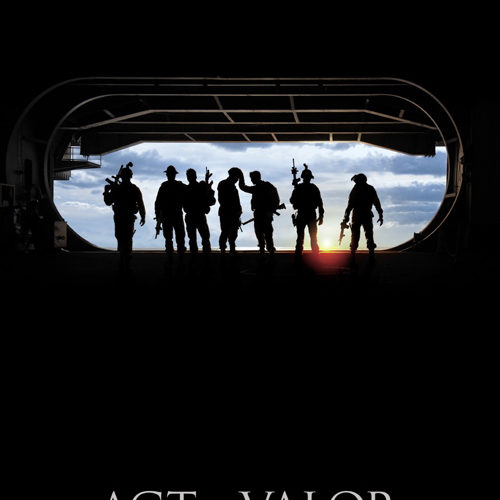Asked by the Navy to create a film to honor the fallen Seals since 9-11 who gave their lives to protect our country, Mike McCoy and Scott Waugh took six months to gain the active team’s trust and begin to understand exactly what they do on a day-to-day basis. As the directing pair’s brief interview playing before my Act of Valor screening explained, once it became time to make the movie neither could fathom doing it with actors who simply could never understand the emotional complexity of such a job. Who besides the actual man could wrap his head around being a 6 foot tall hulk of an Operator barking orders while deployed and a humble, tender father of five back home who leaves them behind with love and duty coexisting in his heart? No one.

So the filmmakers worked hard and cajoled a group of active Seals—who remain uncredited—to not only act as consultants but also as the principle players. They, along with their real life families, show us the normal lives led at home surfing, joking, and creating new families with babies on the way. Each knows the danger and understands the reasons why they go back time after time, but this doesn’t alleviate the pain when saying goodbye. When ‘Rourke’, ‘Ray’, and the others are about to leave home in the film, it’s their wives and children giving the heartfelt embraces at the beach—the pregnant wife of Rourke is actress Ailsa Marshall. It’s an emotional release that only they could portray with complete authenticity and at no other time do these untrained actors feel more real.
The men do a great job in front of the camera considering the foreign feeling it must have been in the grand scheme of things. The amateurish machinations show through when talking and chiding each other, but once the mission begins and the live ammunition flies—yes, they kept it live to maintain full battle-ready performances—these Seals become comfortable and ready to extract the CIA agent they’ve been tasked to find. Cameras are placed in an overhead remote control drone ‘Raven’, on the ground, and atop the men’s heads for first-person vantage points. They rise out of the water, snipe from afar, and go into volatile insanity with adrenaline, confidence, and complete attention. Men will fall and die but each surviving witness sticks to the job at hand to finish the mission first so their brothers don’t sacrifice everything for nothing.
The ‘real’ acting is left for the villains and ‘packages’ of the tale. You’ll recognize CIA Agent Nestor Serrano and perhaps the soon-to-be hostage Roselyn Sanchez, but it’s the evil men at opposition who carry the talky interludes against the precision carnage dealt upon engagement. Christo (Alex Veadov) and jihadist leader Abu Shabal (Jason Cottle) are behind the terrorist plot our heroes are hoping to thwart and both maintain a decent level of malice as they lead their pawns into slaughter. Their weapon is impressive too and I pray it’s potential for being let loose on American soil is fictional because these ceramic ball bearing infused suicide vests are the real deal. Tension mounts as we’re engulfed in the tactical maneuverings to almost make us feel as though we’re watching a documentary—that or being thrust into the midst of a videogame sweeping rooms and watching RPGs whoosh past.

The action is brutal and well conceived to let us forgive the Seals when out of their element playing to the script. Opening with a horrific act at a Manilla school, we know straight away that punches will not be pulled. Gunshots to the head are shown through riflescopes and the pulpy blood left upon exit splatters behind. Bullets fly as though laser beams in the dark and boat extractions by helicopter while still in the water are performed. Even a nuclear submarine is utilized briefly to keep verisimilitude intact, the filmmakers given a quadrant and a four-hour window to find and film it. The Navy truly went all out to tell this story and McCoy, Waugh, and screenwriter Kurt Johnstad did not squander the opportunity.
Told with sporadic voiceover narration courtesy of ‘Ray’, we learn about tradition, honor, and sacrifice as poems by Tecumseh are read and stories of military generations are told. The likes of Christo and Shabal could be any terrorist group—Muslim or otherwise—and they exist to give us a villain. Marks to shoot at when the opportunity presents itself, their run-ins vary from Costa Rican terrain, South Pacific waters, and the rough and tumble unknown of the MexiCali border and the cartels protecting the foreign nationals smuggling into the US. I admittedly enjoyed ‘Sarge’ showing his interrogation skills more than the gunplay throughout, but I cannot deny the effectiveness of such scenes and the immense pride felt when the Seals go in and get out as though another day at the office. For all intents and purposes it was, but that only makes the feat more impressive.
Like an elongated episode of “The Unit” without the drama of home cutting in, Act of Valor throws us to the wolves and let’s the randomness of fate and the precision of training collide to show the lucky majority and the unlucky few. The climactic finale becomes overwrought from sacrifice, but the pay-off of an emotionally stoic Navy Seal funeral redeems its need. An inevitable end, the film wouldn’t be complete without showing such a ceremony and the stamping of pinned crests into the coffin’s lid. It’s bittersweet to remind us what these soldiers do to keep us safe and a pitch-perfect finish to a work more honoring memorial than true film. Whether or not you deem the story and performances adequate enough to give high marks and label ‘cinema’, you can’t deny its message or orchestration. Every American should watch if only to appreciate how great our country is. For that I applaud all involved.
Act of Valor is now in wide release.

